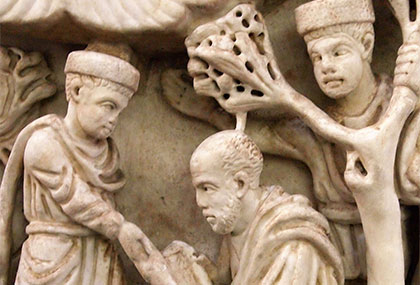CLU44552 Early Christianity

How did Christianity develop from a marginalised and persecuted sect to the dominant religion of the Roman Empire? This module examines the first four centuries of Christianity within the pluralistic context of religious and social life in the Roman Empire. A broad range of literary and material sources will be examined, and a range of modern theoretical approaches considered. Teaching will be structured around broad themes, including belief, scripture, gender, criminality, memory, and the rise of monasticism.
- Module Organiser:
- Dr Rebecca Usherwood
- Duration:
- 1 semester (Jan – Apr)
- Contact Hours:
- 22 hours, 1 x 2 hr class p.w.
- Weighting:
- 10 ECTS
- Assessment:
- 40% continuous assessment, 60% final examination
Introductory Reading
- Lee, A. D. (2016) Pagans and Christians in Late Antiquity. A Sourcebook (Abingdon)
- Gwynn, D. M. (2015) Christianity in the Later Roman Empire. A Sourcebook (London)
- Clark, G. (2004) Christianity and Roman Society (Cambridge)
- Lane Fox, R. (2006) Pagans and Christians (London)
- Cooper, K. (2014) Band of Angels: The Forgotten World of Early Christian Women (New York)
Learning Outcomes
On successful conclusion of this module, students should be able to:
- demonstrate sound knowledge of the main features of Christianity’s development in the Roman empire
- analyse the key primary sources, both textual and material, within their socio-historical contexts
- demonstrate a critical understanding of the major theoretical approaches, debates and scholarship relevant to the module topics
- discuss the above critically and independently, and express themselves above both orally and in written form in a clear and scholarly manner

